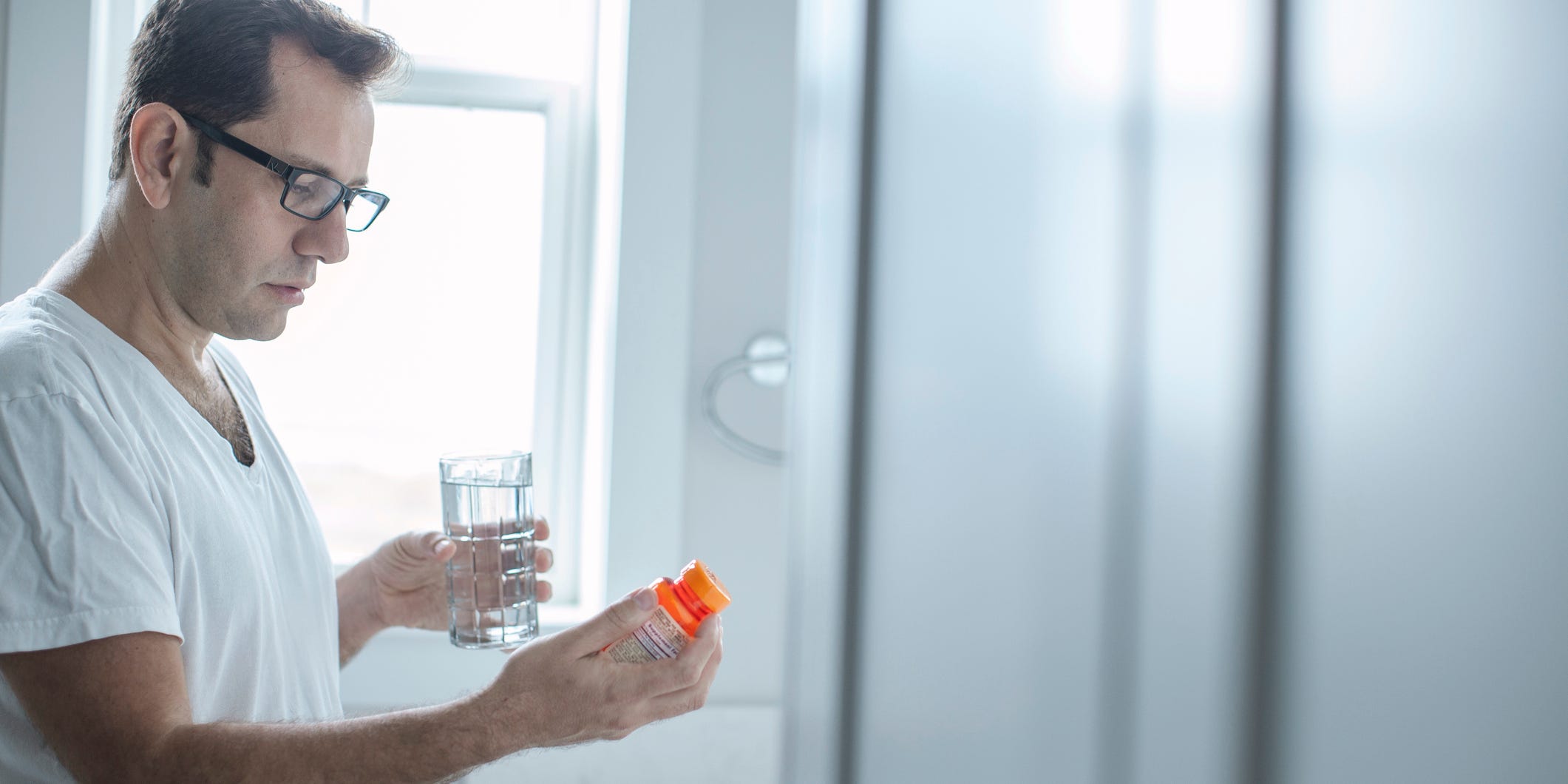
EVOK/M.Poehlman/Getty Images
- Symptoms of mild to moderate lithium toxicity include nausea, vomiting, impaired balance or coordination, and confusion.
- Symptoms of severe lithium toxicity include brain injury, kidney failure, and seizures.
- If you think you are experiencing lithium toxicity, seek immediate medical attention.
- This article was medically reviewed by David A. Merrill, MD, PhD, psychiatrist, and director of the Pacific Brain Health Center at Pacific Neuroscience Institute at Providence Saint John’s Health Center.
- Visit Insider’s Health Reference library for more advice.
Lithium is a medication that helps stabilize moods in people with mood disorders like bipolar or severe depression. But taking more than prescribed or taking lithium in combination with other drugs can cause lithium toxicity, which can have lasting impacts on your health.
Here is what you need to know about the signs of lithium toxicity and how it is treated.
What is lithium toxicity?
Lithium toxicity occurs when blood lithium levels get too high, which can cause organ damage, brain injury, or seizures, says Anandhi Narasimhan, MD, a psychiatrist and clinical instructor at Cedars Sinai Medical Center in Los Angeles, California. This can happen either because you’ve taken too much lithium at once, or due to a buildup of lithium in your body over time.
A safe lithium blood level is between 0.6 and 1.2 milliequivalents per liter (mEq/L), Narasimhan says. Lithium toxicity can happen at 1.5 mEq/L or higher, and a severe lithium toxicity level is 2.0 mEq/L or higher.
Lithium toxicity can be classified into three types:
- Acute, which happens when you take too much lithium at one time.
- Chronic, which refers to the buildup of lithium levels over time.
- Acute on chronic, which is a combination of both. For instance, this can occur when you have taken lithium for a while, but then accidentally take an extra pill one day.
How common is lithium toxicity?
Cases of lithium toxicity among patients with bipolar disorder are rare. According to a 2016 study published in the Journal of Psychopharmacology, about one in every 100 patients with bipolar disorder will experience moderate to severe lithium toxicity. The study examined 1,340 Swedish patients with bipolar disorder on lithium over the course of 17 years.
Those most at risk for experiencing lithium toxicity include:
- Elderly patients over the age of 70. Lithium is more likely to build up in their blood, making them more sensitive to it than younger adults.
- Someone with decreased kidney function. Because the kidneys filter and excrete lithium, someone with impaired kidney function may not be able to expel the drug properly, contributing to higher lithium levels.
- Someone taking other medications that may affect how the body handles lithium, including, diuretics and angiotensin receptor blockers to control blood pressure.
Dehydration can also contribute to lithium toxicity, Narasimhan says because it can decrease the amount of fluid in your system and increase the concentration of lithium in your body.
What are the symptoms of lithium toxicity?
Both acute and chronic lithium toxicity can be dangerous and cause lasting health effects, like brain or kidney damage, says Jeffrey Huttman, PhD, clinical director for iRecovery, a mental health telemedicine provider. If identified early, lithium toxicity can be treated and well-managed, but ignoring mild symptoms can cause the condition to worsen.
Signs and symptoms of mild to moderate lithium toxicity include:
- Stomach pain
- Nausea
- Vomiting
- Diarrhea
- Dizziness
- Hand tremors
- Muscle twitches
- Slurred Speech
- Confusion
- Impaired balance or coordination
Severe cases of lithium toxicity may result in:
- Seizures
- Coma
- Brain injury
- Kidney failure
While hand tremors and nausea are common side effects of the medication, they are more severe in cases of lithium toxicity. If you think you may be experiencing lithium toxicity, seek immediate medical attention, Huttman says, especially if you are experiencing more than one symptom.
How do you treat lithium toxicity?
If you think you might be experiencing lithium toxicity, you should stop taking lithium and any over-the-counter anti-inflammatories, like ibuprofen, which can exacerbate lithium toxicity, Huttman says. Seek immediate medical attention at the emergency room and try to stay hydrated by drinking water.
Mild cases of lithium toxicity can typically be managed by stopping lithium temporarily and staying hydrated with IV fluids, Huttman says. You should only stop your medication under the supervision of a doctor. Your doctor will also closely monitor your blood lithium levels and kidney function.
More severe cases of lithium toxicity could require:
- Stomach pumping, which removes the contents of your stomach.
- Whole bowel irrigation to flush out the gastrointestinal tract.
- Activated charcoal treatment, which uses a refined carbon material that binds to toxins, like lithium, to help prevent further absorption.
- Dialysis to clear out the kidneys.
Patients who experience lithium toxicity often make a full recovery, especially when it is caught early, Huttman says. Those with severe cases could experience irreversible organ damage, especially to the kidneys and heart.
Takeaways
Lithium toxicity is uncommon as it occurs in about one in every 100 bipolar patients. Symptoms of lithium toxicity include nausea, vomiting, and hand tremors. More severe cases of toxicity may result in seizures and kidney failure.
If you are experiencing severe hand tremors, nausea, vomiting, confusion, and impaired coordination, and think you may be experiencing lithium toxicity, seek medical attention immediately as toxicity could result in irreversible organ damage.
Related articles from Health Reference:
- Am I bipolar? The major signs of bipolar disorder
- Is bipolar disorder genetic? Yes, but that doesn't guarantee you'll develop it
- The difference between bipolar 1 and 2, and how to recognize the symptoms
- Signs and symptoms of schizoaffective bipolar disorder
- How to recognize bipolar disorder in children
